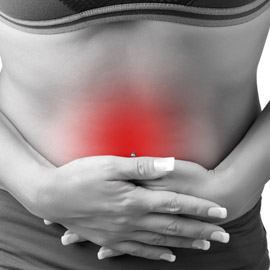 If bending down to do a push-up causes more of a burn in your chest than it does in your arms, you may be dealing with exercise-induced heartburn. This type of heartburn and acid reflux feels the same as other flare-ups of gastroesophageal reflux disease (GERD), but what triggers the onset of symptoms is much different.
If bending down to do a push-up causes more of a burn in your chest than it does in your arms, you may be dealing with exercise-induced heartburn. This type of heartburn and acid reflux feels the same as other flare-ups of gastroesophageal reflux disease (GERD), but what triggers the onset of symptoms is much different.
GERD is sometimes caused by a hiatal hernia, an opening in the diaphragm that allows the stomach to bulge up into the chest. In other cases, GERD occurs due to a damaged lower esophageal sphincter, which could develop as a result of injury or excess pressure on the stomach from pregnancy or obesity. Many people think of spicy foods and citrus as the chief offenders for acid reflux and heartburn, but for those who have exercise-induced heartburn this isn’t the case.
Going for a run, doing jumping jacks or diving into the pool may cause heartburn to flare up. Some people have such severe symptoms that they feel they need to give up exercise for good to eliminate the uncomfortable burning and reflux that accompanies their routine.
Exercise and Acid Reflux
Exercise-related reflux is most commonly associated with intense activities, as well as activities that require a great deal of bending. This includes things like running, jump rope, weightlifting and yoga.
To reduce your risk of experiencing acid reflux while working out, try the following tips:
- Don’t eat before your workout: Those with nighttime GERD adjust their eating habits to avoid eating before going to bed. For those who have exercise-induced heartburn the same strategy can work. Avoid eating any foods two to three hours before working out, and stick with water instead of electrolyte-heavy sport drinks. If you need a pre-workout snack, try having something small and soothing like a banana or yogurt.
- Change your workout routine: Activities that put your head below your chest can make it easier for acid to reflux into your esophagus. Try eliminating workouts like push-ups and sit-ups that require you to bend over. While running is a great workout, it is intense. Activities that require jumping and running can jostle your stomach and cause digestive juices to splash into your esophagus.
- Change your diet: There is a chance that your heartburn is the result of dietary triggers, but that it is most evident during your workout. Things like caffeine, heavy carbohydrates and carbonated, sugary drinks can trigger acid reflux.
Sometimes, alleviating acid reflux during exercise is as simple as changing up your workout routine, but this isn’t always enough to correct the problem. If acid reflux is interfering with your active lifestyle, then it may be time to consult with a reflux expert about treatment options.

Leave a Reply